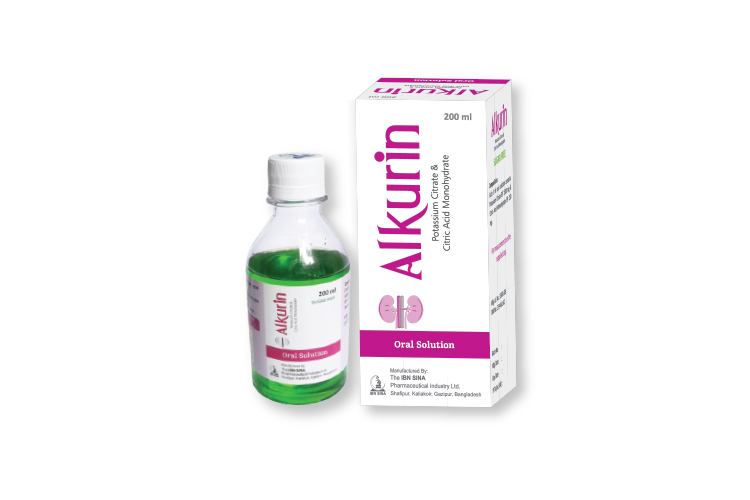
ALKURIN
POTASSIUM CITRATE; CITIC ACID
| NAME | STRENGTH | PACK SIZE | DOSAGE FORM |
|---|---|---|---|
| ALKURIN (150MG+250MG)/5ML | (150MG+250MG)/5ML | 200 ML | SOLUTION |
Each 5ml oral solution contains Potassium Citrate BP 1.5g and Citric Acid Monohydrate BP 250mg.
Potassium Citrate and Citric Acid oral solution is a stable and pleasant-tasting oral systemic alkalizer. Potassium Citrate is absorbed and metabolized to Potassium Bicarbonate, thus acting as a systemic alkalinizer. The effects are essentially those of chlorides before absorption and those of bicarbonates subsequently. Oxidation is virtually complete so that less than 5% of the Potassium Citrate is excreted in the urine unchanged. It alkalinizes the urine without producing a systemic alkalosis in recommended dosage.
Is indicated in following cases: To relieve discomfort in urinary tract infections due to decreased pH or acidic urine. In preventing kidney stone formation specially caused by uric acid with or without the presence of calcium stones. In gout therapy as a valuable adjuvant with uricosuric agents. Also effective in correcting acidosis caused by kidney disease.
Dosage and Administration: Oral Solution should be taken diluted in water according to directions, followed by additional water, if desired. Palatability is enhanced if chilled before taking. Proper dilution may help prevent gastrointestinal injury associated with the oral ingestion of concentrated potassium salt preparations. To relieve discomfort in UTI:
Adults and children over 6 years: 10 ml 3 times daily, diluted with 1 glass of water.
Children 1-6 years: 5 ml 3 times daily, diluted with ½ glass of water.
To prevent kidney stones & acidosis caused by kidney diseases:
Adults: 10-15 ml 4 times daily (or as directed by the physician) diluted with 1 glass of water.
Children: 5-10 ml 4 times daily (or as directed by the physician) diluted with ½ glass of water.
In gout therapy (with uricosuric agent):
Adults: 10-15 ml 4 times daily (or as directed by the physician), diluted with 1 glass of water.
Children: 5-10 ml 4 times daily (or as directed by the physician), diluted with ½ glass of water.
Severe renal impairment with oliguria or azotemia, untreated Addison's disease, adynamia episodica hereditaria, acute dehydration, heat cramps, anuria, severe myocardial damage, and hyperkalemia from any cause. Known hypersensitivity to any ingredient.
The solution should be used with caution in patients with low urinary output. It should be diluted adequately with water to minimize the possibility of gastrointestinal injury associated with the oral ingestion of concentrated potassium salt preparations; and preferably, to take each dose after meals. Large doses may cause hyperkalemia and alkalosis, especially in the presence of renal disease.
This solution is generally well tolerated without any unpleasant side effect when given in recommended doses to patients with normal renal function and urinary output. However, as with any alkalinizing agent, caution must be used in certain patients with abnormal renal mechanisms to avoid development of hyperkalemia or alkalosis. Potassium intoxication causes listlessness, weakness, mental confusion, tingling of extremities, and other symptoms associated with a high concentration of potassium in the serum.
Pregnancy: Combination of Potassium Citrate & Citric Acid Monohydrate should not be used during pregnancy unless the potential benefit justifies the potential risk to the fetus.
Lactation: It is not known if this drug is found in breast milk or not. Breast-feeding women should consult with their health care provider to confirm about taking this drug.
undefined
Severe renal impairment with oliguria or azotemia, untreated Addison's disease, adynamia episodica hereditaria, acute dehydration, heat cramps, anuria, severe myocardial damage, and hyperkalemia from any cause. Known hypersensitivity to any ingredient.
The administration of oral potassium salts to persons with normal excretory mechanisms for potassium rarely causes serious hyperkalemia. However, if excretory mechanisms are impaired, hyperkalemia can result. Hyperkalemia, when detected, must be treated immediately because lethal levels can be reached in a few hours. If hyperkalemia occurs, treatment measures will include the followings: (1) Elimination of foods or medications containing potassium. (2) The intravenous administration of 300 to 500 mL/hr of dextrose solution (10 to 25%), containing 10 units of insulin/20 gm dextrose. (3) The use of exchange resins, hemodialysis, or peritoneal dialysis.
Store in a cool (below 30°C) and dry place protected from light and moisture. Keep out of the reach of children.
Each pack contains 200 ml oral solution in PET bottle and a measuring cup
